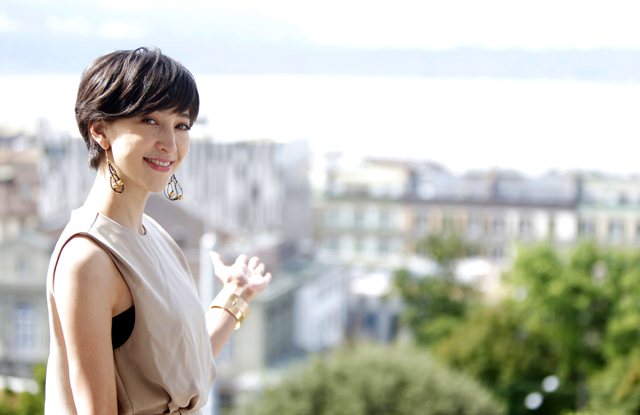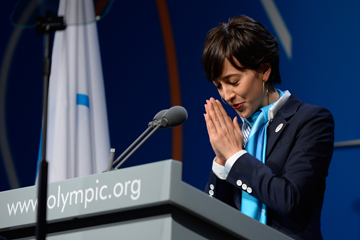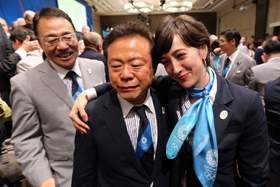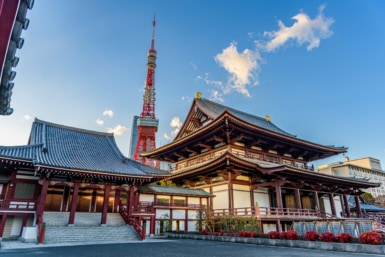The worlds’ eyes are on you. The hopes of your country are weighing on your shoulders. Your heart is racing and the butterflies in your stomach have traded their wings in for jet engines. These are just a few of the sensations that athletes at the 2020 Olympics in Tokyo might be feeling when they get ready to compete. But before the races can be run and before that torch is lit, a city has to be chosen.
By Alec Jordan
The International Olympic Committee (IOC) weighs many concerns well before its decision. But the final push is delivered by the cities’ bid teams, which should represent the best facets of their cities: what they are now, and what they have the potential to be. Without a doubt, the members of the team are feeling the pressure, just as an elite athlete might when it comes to that crucial moment.
This was the pressure that Christel Takigawa felt, getting ready to speak in Buenos Aires on behalf of Tokyo’s Olympic bid. As she told the Weekender, although she wasn’t setting herself in front of the blocks like a sprinter or visualizing her floor routine like a gymnast, she was feeling more than a bit of nerves: “If we fail, what will happen? That was the thought that kept running through my mind.”
Her speech, delivered in French—Takigawa was born in Paris to a French father and a Japanese mother, and she grew up in Tokyo—went over without a hitch. She spoke about the Japanese spirit of omotenashi, which combines the concept of hospitality with a sense of giving the other person space. But what stood out most in her speech was her delivery of the word at the beginning. Each syllable said with a pause and a gesture of her hand, it came out o-mo-te-na-shi, and she repeated it again with a bow.
Despite some joking about the speech in the media, Takigawa explains that the positive response from the public that she has received has far outweighed any criticism. In fact, it has been overwhelming: “I got so many emails from people just saying ‘Thank you; on Japan’s behalf, thank you so much.’ I’ve never experienced anything like that in my life.”
From the News Team to the Bid Team, and What the Olympics can bring to Japan
As we continued our conversation about her role as a representative of Japan, her thoughts on how the Games might help influence the city, and how she felt about being half French and half Japanese, she responded impartially, befitting her position as a television journalist. Takigawa was a newscaster for Fuji Television’s evening and Sunday news until last year, when she began working on NHK World TV Channel’s international affairs news program, Global Debate WISDOM.
Each bid team presenter focused on one reason that Tokyo should host the Games, and Takigawa tells us that she chose to speak about omotenashi because it’s an aspect of Japanese culture that is always close to her heart: “Regardless of what generation a person might be from, or where you are in Japan, you will encounter that spirit of omotenashi: it outweighed all of the other things I could have spoken about. Even when I come back to Japan from being abroad, that feeling is one of the first things that hits me.”
An avid tennis player, Takigawa was active in many sports as a student, and she looks forward to seeing the top athletes of 2020. When we asked her which event she’d compete in if she could, she said she wanted to try the equestrian events—even though she hasn’t tried them before. She adds, laughing: “With horse riding, I might still be able to compete in 2020!”
Beyond the focus on sports, Takigawa hopes that hosting the Games will give back to the country: “One thing I hope is that they will help Japan become a more international country. Right now, the fact that fewer and fewer young Japanese people are choosing not to study abroad is a pity. As a host country, we can’t have Japan be a place for ‘Japanese only’. So what I hope will happen is that younger Japanese will study abroad, but also that English education overall will improve.”
In addition to raising Japan’s overall English level—and she plans to improve her own English—Takigawa says that it is just as important for Japanese, young and old, to expose themselves more to a variety of different foreign cultures, even through events like the cultural festivals around Tokyo: “Even getting involved in events that introduce other cultures is important, and they can be enlightening for the people who take part in them.”
An Ambassador of Cool, and a Symbol of Japan’s Future
Takigawa was declared the Ambassador of “Cool Tokyo” when she joined the bid team in June, so we wanted to hear her thoughts on how the city could keep its cool edge going into the future. She acknowledged food, pop culture, and fashion as areas to watch, but she has big hopes for a greener Cool Tokyo, with some inspiration from abroad: “It would be cool for Tokyo and Japan to become even more ecological: we already do a lot, but to be able to look to the Scandinavian countries and emulate the sort of things they are doing, that would be great too.”
The other things Takigawa sees for the future have a lot to do with her presence on the bid team: as a mixed-race Japanese woman, she represents a lot of what Japan would like to show the world: “One image of Japan is of course, the ojiisan (the old man), and to show that this is not the only thing in Japan, we had women there (she and Paralympian Mami Sato, who presented her speech in English) in important positions, showing that Japanese society also places a high value on women in society. I believe that the power of women is definitely growing in Japan!”
“Regardless of what generation a person might be from, or where you are in Japan, you will encounter that spirit of omotenashi”
Finally, as a person of mixed race, Takigawa acknowledges that she can stand as another example of what Japan can be: “I come from two different cultures, but I’ve lived most of my life in Tokyo, doing this work, being the person I am: this is what Japan is becoming. Tokyo can begin with this image too.” In Japan, people who have mixed parentage can sometimes have a hard time fitting in, but Takigawa’s experience has been one that has allowed her to celebrate the full measure of her identity, which see sees as “double,” not “half”: “If I didn’t feel Japanese, I wouldn’t have been able to express what omotenashi really meant. I understand it because I’ve lived here a long time, I know this culture. I’m ‘double’ but also Japanese.”
Of course, we can’t say what storylines will develop as Tokyo prepares to host the Games of the XXXII Olympiad, but as a journalist, Christel Takigawa will continue to be in the position of being someone who covers the news and has made news at the same time.
Updated On April 14, 2014










